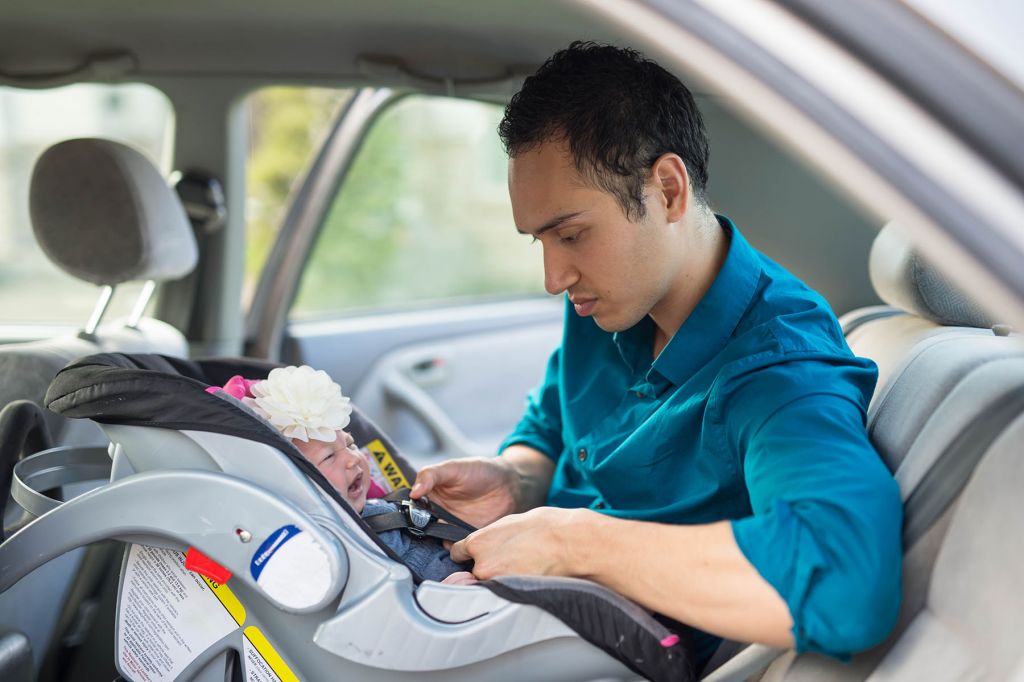Your new baby is the most precious you will ever hold. And during the first years of his or her life, your baby is 100% dependent on you for safety, comfort and health. So take these steps to keep your new family member safe 24 hours a day, wherever you are.
Buckle-up
You can’t leave the hospital without a car seat. If you need help finding one or installing one, the Texas Safe Riders program can help you. Make sure everyone else is buckled up, too.
Learn More at Safe Kids of Tarrant County
Quit smoking
Second hand smoke is a danger for all persons, especially young children. Make sure your child is not in the area when someone is using cigarettes or E-cigarettes.
Follow the ABCs of safe sleep
During the first few months, your baby will sleep between 15 and 20 hours a day. Babies sleep safest when all caregivers (including grandparents, babysitters and day care providers) follow the ABCs of safe sleep:
- Alone: Babies should sleep alone, without parents, siblings or stuffed animals.
- Back to sleep: Babies should sleep on their backs. The Back to Sleep national campaign has reduced SIDS (Sudden Infant Death Syndrome) deaths in America by 50%. It’s hard for babies to breathe when they sleep on their sides or bellies, and they can suffocate.
- Clean and clear crib: The safest place for a baby to sleep is a crib with a tight-fitting mattress and no toys, blankets or baby bumpers. Dress your baby in a light onesie and try to keep the temperature around 70 degrees, as babies don’t regulate their temperatures well and can easily overheat.
If your baby is not sleeping in a safe place, he or she can easily slide into a position that won’t let him or her breathe. To make sure your baby is safe:
- Never let your baby sleep in a car seat, swing, bouncy seat or stroller.
- Never put your baby to sleep on a pillow, sofa, quilt, rug or other soft surface.
- Never put your baby to sleep on a couch or armchair.
Learn More about Safe Sleeping
Keep up when baby is on the move
As your baby grows, there will be more dangerous things around them. Avoid danger by always keeping an eye on your baby.
Before they can even crawl, babies can move around. They can roll, slide and fall when you’re not looking. Always place babies on firm, flat, enclosed surfaces.
If you need to put the baby down, be sure to use harnesses or belts that come with changing tables, high chairs and swings.
Learn More about Child Safety from the CDC
Take weather and water safety precautions
During the summer months in Texas, babies can easily overheat because of their poor temperature regulation. Never leave a baby in a car unattended. Not only is it against the law, but it also creates a real risk of death. This can be dangerous on a cool, spring day, too.
Learn More about Weather Safety from the CDC
Never take your eyes off children around water. Babies can drown in just an inch of water. Bathtubs, pools and even buckets can be serious drowning hazards. Always make an adult responsible for watching your baby while playing near water.
Learn More from Water Safety USA
Healthy relationships = Healthier homes
Healthy relationships make for healthier homes. These relationships are built on respect, communication and giving people the freedom to be comfortable, happy and honest.
If postpartum depression is a concern for you or your loved one, call the National Institute of Mental Health toll-free at 1-866-615-6464.
If you are experiencing violence or abuse in your home or work contact the National Domestic Violence Hotline by calling 1-800-799-SAFE (7233).
Need Help Finding Resources?
>Learn How to Recognize and Deal with Depression
Be smart about screen time
The World Health Organization has created a report on screen time usage for young children. According to their report, children under the age of 2 should not be using electronic devices such as cell phones, tablets, or the television outside of the context of video chatting with the parent’s help to loved ones.
Children aged 2-5 should only be allowed one hour a day in front of a screen. This time being spent with electronics can take away from the parent’s ability to bond with their child, play, and read together.
Overuse of screen time can be linked to childhood obesity, sleep issues, and other chronic conditions. It has also been seen to lead to attention problems, slower language development, and potential behavior problems.
Playtime is the best time
Young children should be physically engaged in activities and active in their social learning, not acquiring it through a device. Playtime between the parent and child is more beneficial to the development of the child than screen time.
If your child is going to use electronic devices, seek out interactive, high quality, and educational options with parental controls present to limit content type.
When young children are using electronic devices, parents should monitor them to ensure they are using appropriate content and watch out for ads or materials that children could easily access through clicking links within the applications they are using.
Regardless of how much or what kind of screen time young children are engaging in, boundaries of screen-free times like family meals or car rides are healthy for families to keep close relationships, show respect amongst family members, and show the importance of personal relationships and communication over the usage of media. These screen-free times are especially important as children today are growing up in a media based culture.
Learn More about Technology and Young Children



